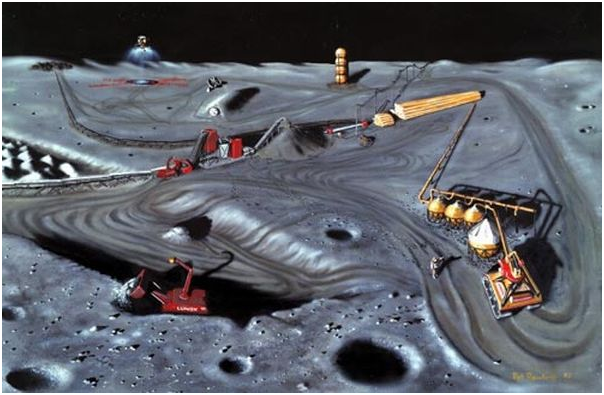I write a blog on nuclear issues at www.nucleotidings.com. One of the things I have covered on that blog is research on thermonuclear fusion. There are a number of different companies working on fusion reactors which will produce power by fusing lighter elements into heavier elements. There are several elements that are being considered by researchers to fuel their reactors. Hydrogen, deuterium, tritium and helium-3. Hydrogen is abundant on Earth. Deuterium or hydrogen with a neutron in the nucleus is present in terrestrial water in a ratio of about one atom of deuterium for every thousand atoms of normal hydrogen. Tritium is very rare on Earth. It is produced naturally by the action of cosmic rays on hydrogen in the atmosphere. It is also produced certain nuclear processes intentionally or as a by-product of other useful nuclear processes.
Helium-3 is produced when tritium decays and it is extensively used for medical imaging as well as a potential fusion fuel. Helium-3 is not radioactive and, if a fusion reactor could be developed that would use helium-3 as a fuel, there would be no creation of radioactive waste or danger of serious radiation leaks. Like tritium, helium-3 is very rare on Earth. However, millions of years of bombardment of the lunar regalith by the solar wind has produced helium-3 on the Moon's surface. It is estimated that there may be as many as a million tons of helium-3 on the Moon. One ton of helium-3 contains energy equivalent to fifty million barrels of crude oil.
China has a huge population and a growing economy. It currently burns great quantities of fossil fuels and has ambitions to build hundreds of conventional nuclear power plant. However, those two sources of energy will not be able to sustain China in the coming decades so they are exploring other sources of energy such as solar, wind and fusion. China also has an ambitious space program. They are very interested in creating a permanent manned base on the Moon. They plan to send astronauts to the Moon by the 2020s.
If helium-3 burning fusion reactors can be developed and if China can establish a mining base on the Moon, China will have all the energy it needs without fossil fuels or conventional nuclear reactors. Given the climate problems caused by fossil fuel emissions and the decreasing supply on Earth, new sources of energy will be very valuable. If China manages to mine helium-3 on the Moon and return it to the Earth, China could sell helium-3 to the rest of the world. This would give China a huge advantage in international trade and great political influence. Other major space powers would have to respond with lunar mining operations of their own. There could be a new Moon race with helium-3 as the prize.
There are international treaties that say that countries and companies are not allowed to own parts of astronomical bodies without permission of other nations and sharing what they obtain from astronomical bodies with other nations. Ultimately, the old treaties will be updated or ignored in a race to commercialize space. Hopefully these disagreements can be settled diplomatically and will not result in militarization of the Moon.
Artist's concept of lunar helium mining:
